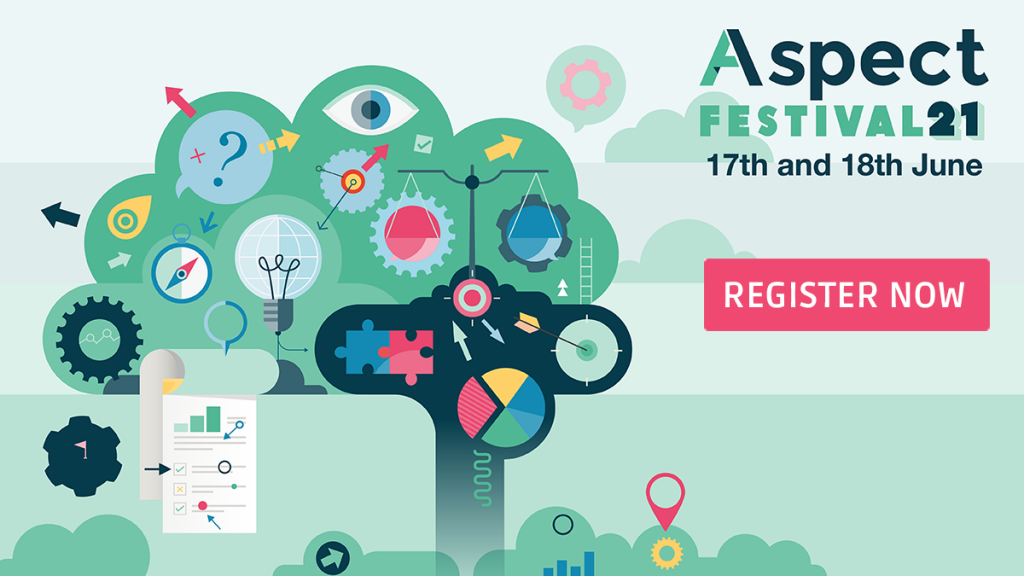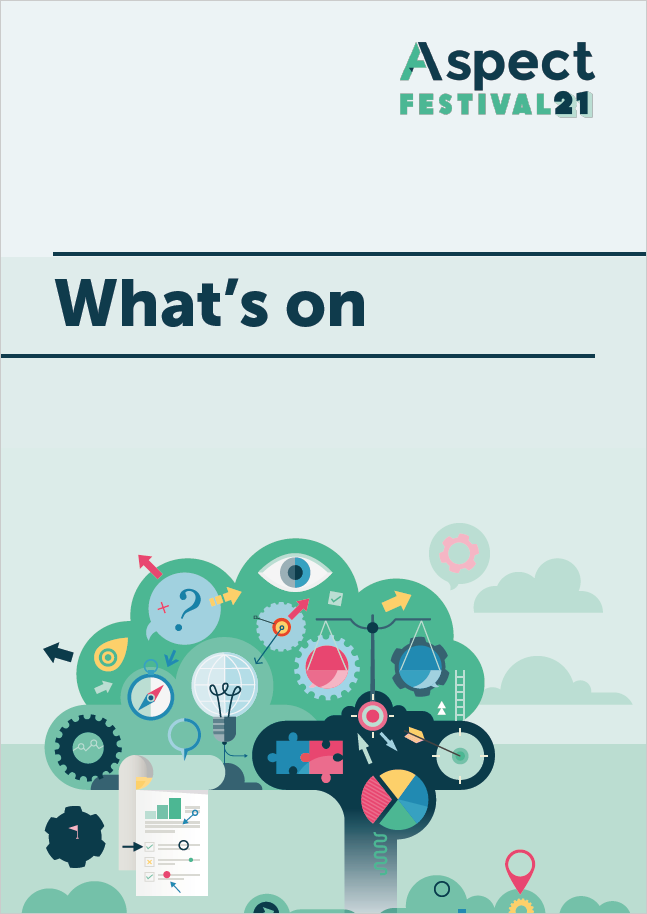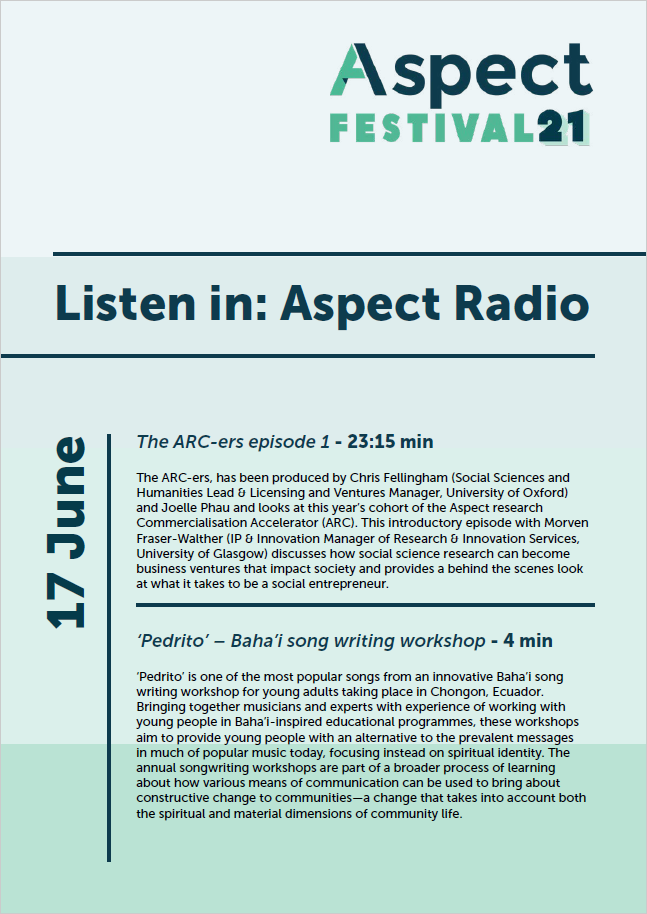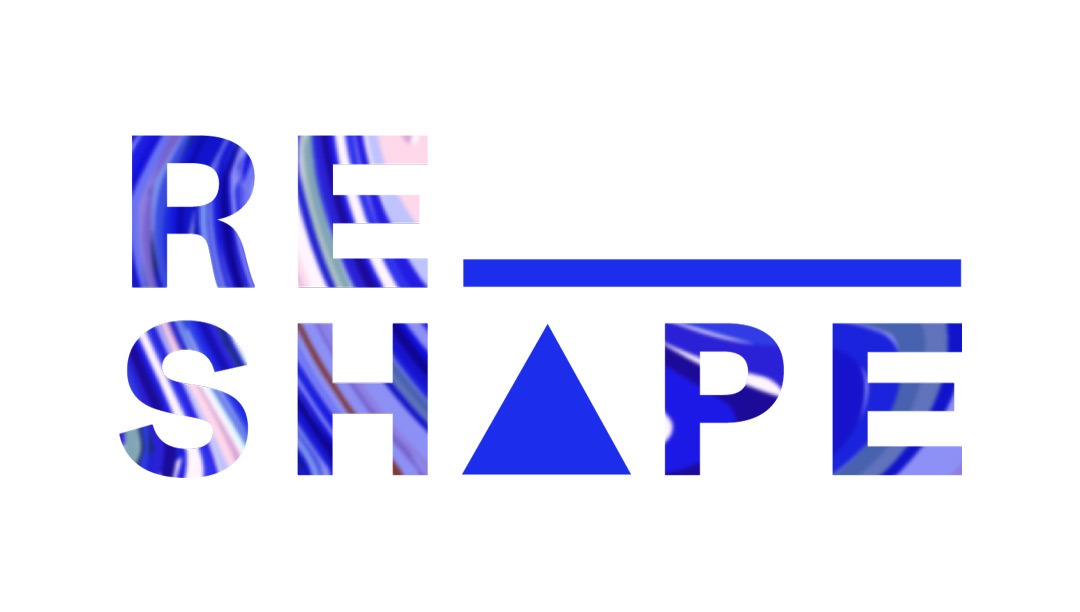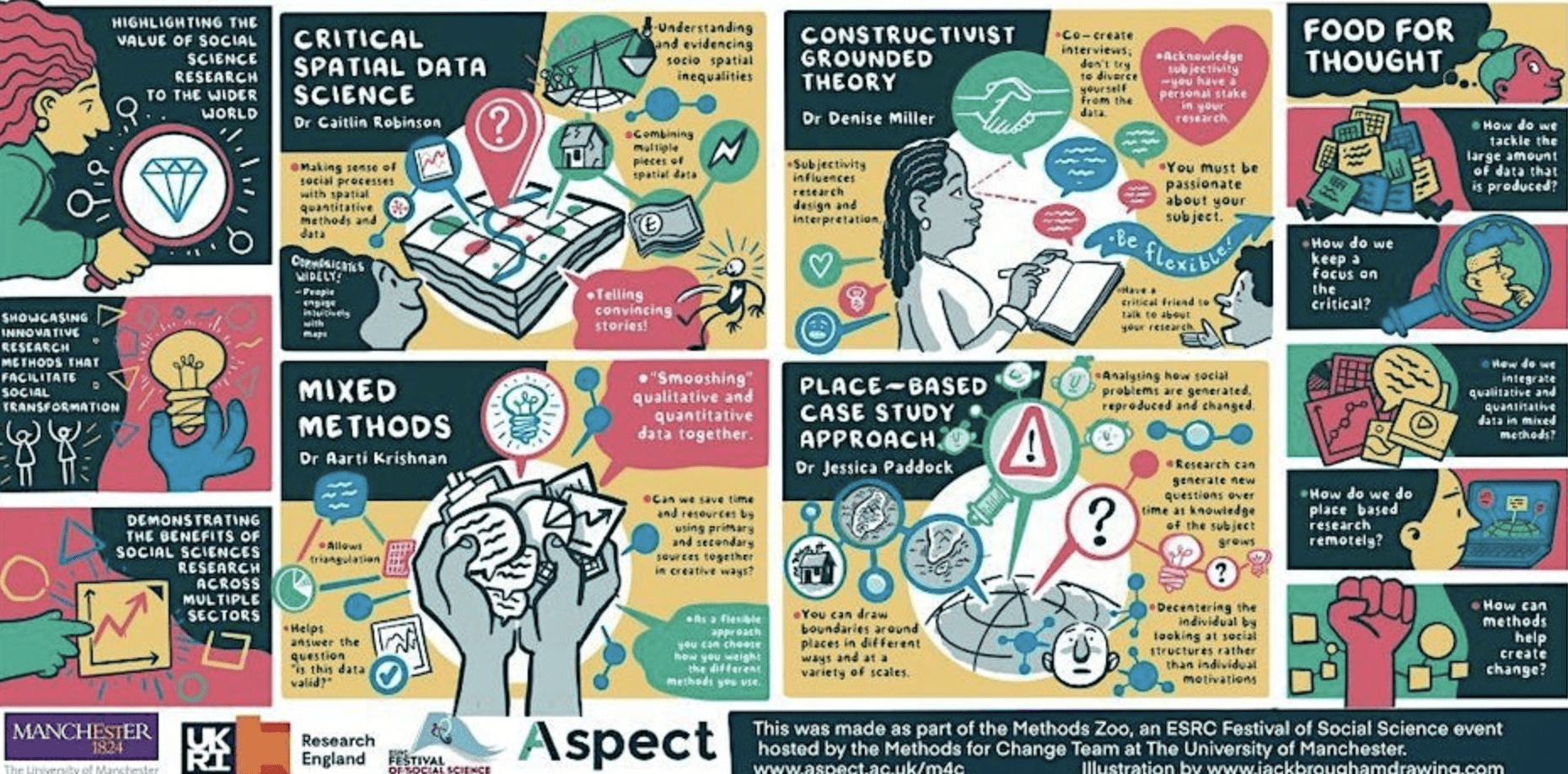ASPECT Festival21

Over the course of two days we dove into workshopping and networking around the barriers to research commercialisation; engaging businesses; stimulating impactful entrepreneurship, exploring the unique opportunities of commercialising the social sciences, arts and humanities to build a brighter, more inclusive future.
We were joined by leading voices, thought-leaders and trend-makers, with special guests and performances. Follow us on Twitter @aspect_network or LinkedIn.
The schedule
Thursday June 17th
9:00am-10:00am:
SHAP[E]ing Innovation
To open the festival we joined Professor Julia Black, Strategic Director of Innovation, London School of Economics and Political Science in conversation with Ravi Gurumurthy, Chief Executive Officer, Nesta to look at how the social sciences, arts and humanities (SHAPE) are contributing to innovation as society changes. This session asked how SHAPE embraces the future in an ever-changing world, and discussed what is taking place right now that shows the positive impact of SHAPE in society.
10:00am-11:00am:
Insight Session: The role of social sciences in advancing Fintech, Legaltech, Healthtech and the Creative industries; the challenges, successes and the way forward
The Aspect Business Engagement Community of Practice (BE CoP) have led a series of Aspect-funded projects focussed on developing good practice in and exploring challenges related to industry and academic engagement in social sciences. While there are a breadth of industries where social sciences can add value, four sectors were chosen as focus points for ‘deep dives’: Creative Industries, FinTech, LegalTech, and HealthTech. During this session, BE CoP members were joined with Social Science academics from their institution to share challenges identified, lessons learned, and tips for engaging in the sectors.
Chaired by: Britta Wyatt, Managing Consultant at Oxentia
Panellists included: Alexander Riley, Aspect Broker for University of Manchester, Dr Rachel Rahman, Psychology Department, Aberystwyth University, Laura Hockenhull-Smith, Research, Business & Innovation, Aberystwyth University, Professor Jonathan Beaverstock, School of Management, University of Bristol, Dr Helen Mullen, Adam Smith Business School, University of Glasgow, Dr Dominic Chambers, Adam Smith Business School, University of Glasgow, Dr Gordon Meiklejohn, Research and Innovation Services, University of Glasgow, Dr Ruth Welters, Faculty of Social Sciences and Law, University of Bristol, David Dalley, Psychology Department, Aberystwyth University, Horatio Mortimer, Business Innovation Manager, LSE Research and Innovation.
11:00am-11:30am:
Unconference: Business Engagement Sector Deep Dives
Attendees were invited to join the Business Engagement Community panellists and project members in this interactive networking session. Reflecting on the talks from the previous session, this unconference gathered a shortlist of topics that participants were keen to explore further in smaller discussion groups.
11:30am-12:00pm:
Coffee with Madeleine Kessler – co-curator British Pavilion at the Venice Biennale
Madeleine Kessler is co-curator of the British Pavilion at the Venice Architecture Biennale 2021 and graduate of Aspect Member the University of Sheffield. Passionate about promoting a creative understanding of the city, and how we can generate participatory communities, Madeleine also sits on the National Infrastructure Commission’s Design Group. We caught up with Madelaine about her work and the commission for the British Pavilion which engages with the current on-going debate around ownership and public space, with “a series of immersive spaces, commissioned from leading researchers and practitioners, presenting both a critique of how they are currently used while providing strategies to increase people’s agency over their public spaces”.
12:00pm-1:30pm:
The insider’s view from the Aspect Student Accelerator Programme (ASAP) and £100 Crowdsourcing Contest
This interactive session looked at how the social entrepreneurs of ASAP were able to get their first paying customer thanks to various resources offered during the programme (Mentorship, Bootcamps, Stipend, Alumni Support sessions etc). Sharing their journey and progress as a result of the accelerator and giving advice to future candidates while walking university staff through the advantages of the resources of ASPECT.
In a fast-paced and exciting finale, a crowdsourcing contest tackling ASAP start-up challenges was held, with ideas being generated to tackle these and the best idea being awarded a £100 prize voucher!
1:30pm-2:00pm:
Reset: Lunch-time performance by Helen Newby
Renowned for her ‘intimate balanced sound’ (The Washington Post), Helen Newby’s music hinges around the notion of collaboration, continually seeking to expand both the technical and expressive boundaries of her instruments in an embrace of today’s technologies.
Extending the essence of collaboration into the educational sphere, Helen works extensively with emerging composers, performers, and communities of listeners. She has held workshops and given concerts for undergraduate and graduate students at institutions including Oberlin College, Brown University, Georgia Southern University, DePauw University, SUNY Fredonia, Hillsdale College, Tromsø University, and the Norges Musikkhøgskole. She maintains a private teaching studio in Brooklyn, NY.
2:00pm-3:00pm:
Inter-Community Session: What is unique about social science ventures and how to best support them?
Over the course of the pandemic many people have been forced to be more entrepreneurial. The way we work, the way we communicate and the way we develop ideas has changed. At the same time, the pandemic has brought entrepreneurship to the forefront in other ways, with carbon footprint, healthy eating, well-being and many more areas having a spotlight shone on them and providing more opportunities for innovative ideas and solutions to flourish.
But how do we give entrepreneurial ideas the tools and guidance they need to succeed? How do we stimulate the pipeline of entrepreneurial talent both at and coming out of universities, and how do we provide the best chances for success in not only levelling-up but scaling-up?
Led by Tony Walker, Deputy Director of the Masood Entrepreneurship Centre at the University of Manchester, and joined by LJ Silverman (Head of LSE Generate, London School of Economics and Political Science), Chris Fellingham (Director of the ARC Accelerator and Social Sciences and Humanities Lead at Oxford University Innovations) and Rachel Middlemass (Head of Research and Development Partnerships, Zinc).
This session looked across the Aspect communities to consider what is unique about social science ventures and how to best support them.
3:00pm-4:00pm:
Place Session: Nurturing the Impact Power of Social Sciences and Humanities – A Journey Through (Parts of) Europe
We were joined Dr Christoph Koller, Professor Johannes Vogel, Director General, The Natural History Museum, Berlin, Germany and Dr Gerard Nijsten, Director, Library of the University of Amsterdam, The Netherlands, on a journey across Europe to examine good practices and approaches on knowledge transfer, knowledge exchange, and impact management.
Friday June 18th
9:00am-10:00am:
Breakfast with ARC
Social scientist researchers have been part of a pioneering accelerator programme – the ARC (Aspect Research Commercialisation) Accelerator programme. With dozens of amazing commercialisation opportunities, researchers have been working on developing their projects, finding new ways to impact their chosen populations. From a hand-washing robot, to teacher training, to supporting children living in poverty, the diversity of projects was showcased, allowing guests to be part of the conversation.
Led by Morven Fraser-Walther, IP & Innovation Manager of Research & Innovation Services, University of Glasgow, this session provided an informal way to meet a number of participants across the two cohorts including Professor Rob Klassen, University of York – Eduselect, Dr Nai Rui Chng, University of Glasgow – Good Evaluation, Professor Michael Bruter, LSE – CODES, Dr Amol Deshmukh, University of Glasgow – WallBo, Dr Sarah Ward, University of Glasgow – Children’s Voicesand Dr Hibbah A Osei-Kwasi, University of Sheffield – Sahara Nutrition. In this session, learned more about their projects, what they’ve been up to, and how they feel social science commercialisation can move forward.
10:00am-11:30am:
Insight Session: The state of research commercialisation across the social sciences, arts and humanities with the Aspect Research Commercialisation Community
The pandemic has brought the spotlight to bear on the power of STEM research and researchers in responding to one of the greatest challenges of our generation. With governments looking to universities to generate research-intensive ventures to solve problems and power the next wave of economic growth, social sciences and humanities are entering the fray. What do these emergent ventures look like? What problems are they solving and what do universities need to do to solve them?
Deep-diving into the Aspect Research Commercialisation Community, this session looked at the state of research commercialisation across the social sciences, arts and humanities and explores the learnings, barriers and priorities institutions have faced over the years, and importantly, what needs to be done moving forward.
Lead by Chris Fellingham, Director of the ARC Accelerator and Social Sciences and Humanities Lead at Oxford University Innovations and with examples from panellists including James Kitson, Head of Commercialisation University of York, Annie Thirlwell, Research Enterprise Manager for Arts, Humanities and Social Sciences at The University of Sheffield and C. David Ai, Head of Innovation at London School of Economics and Political Science, this session examined the big picture of social science research commercialisation and delved into both expectations and practical steps for the future.
11:30am-12:00pm:
Coffee with: Klaus Thymann and Renate Aller – Project Pressure
Danish born Klaus Thymann is a multi award-winning photographer, filmmaker, explorer, writer, creative director and environmental consultant who founded Project Pressure – a charity with a mission to visualise the climate crisis. Using visual art as a positive touch-point to inspire action and behavioural change, they work with world-renowned artists to conduct expeditions around the globe, creating eye-opening work that endeavours to incite social and political change. The projects are developed and executed with scientists to ensure accuracy, resulting in work from every continent on the planet.
Project Pressure has pioneered innovative, new technological strategies and forged partnerships with the World Glacier Monitoring Service (WGMS) and the National Aeronautics and Space Administration (NASA).
We caught up with Klaus and Renate Aller, one of the artists Project Pressure collaborates with. Focussing, primarily on portraiture and landscape, Renate is best known for expansive, poetic images that visually unite two ostensibly different environments—the ocean and the desert. Her luminous yet quiet landscapes embody the qualities of classical portraiture, with the ocean or desert replacing the human subject. Tracing an unbroken line, the eye is guided from one sweeping landscape to the next without doubting their separateness in location and origin. Renate Aller intentionally pairs images for each installation, forming an immersive panorama showing the interconnectedness of distant environments, opening up conversations between the different (political) landscapes in which we live.
12:00pm-1:00pm:
Workshop Session: Methods for Change + Do Not Adjust Your Stage
The highly successful Methods for Change project brought together social scientists from across the Aspect network to discuss the research methods they use, how methods create change in society and produce a series of ‘how-to guides. With accompanying outputs created in collaboration with artists, filmmakers and illustrators, many of the methods built on ideas around the generating engagement, gathering of stories, and the value of game playing.
In this fun and interactive training session the Methods for Change team joined the multi-award-winning improvised comedy group Do Not Adjust Your Stage (DNAYS). The session focussed on developing improv and comedy skills that we hope led to new professional and multidisciplinary understandings around communication and listening.
1:00pm-2:00pm:
Reset: Lunch-time performance by the Isolation Choir
The Self-Isolation Choir is an online choral project set up by Mark Strachan and directed by Ben England, a graduate of Aspect Member Bristol University who was recently awarded the British Empire Medal by Her Majesty Queen Elizabeth II in recognition of his services to choral singing during the pandemic. The Self Isolation Choir was formed in response to the global impact of the Coronavirus. Singers from around the world can join and take part in the events and activities organised by the choir from their own home. The choir has grown to 12,000 strong with members collaborating on performances from around the globe, making it one of the largest choirs on the planet.
Their inaugural project Messiah at Home was produced with some of the world’s greatest musicians including Laurence Cummings, Carolyn Sampson and Jennifer Johnstone and gained international attention. Messiah at Home was featured on the national BBC Evening News, all the BBC radio stations, NHK (Japan) CBS (USA) and many more – and has become part of the official Wikipedia entry for Messiah. We heard an anniversary rendition of Messiah with a special introduction by Mark and Ben discussing how an entrepreneurial approach reinvigorated a traditional way of operating, and their ambitions to bring the social cohesion created by singing into universities world-wide.
2:00pm-3:00pm:
Inter-Community Session: Structuring support services in a fast-moving world
The development of social science research commercialisation services, including student entrepreneurship and business engagement, is driven by the ability to enable and sustain impact, yet achieving this across academic institutions with varying characteristics and resources is often fraught with complexity and non-obvious opportunities can be missed. How can different parts of the research commercialisation ecosystem come together to address these gaps?
We traversed the Aspect communities to identify innovative ways for higher educational institutions to set up their offering and structure support services; from ideation through to partnership engagement and venture launch.
Chaired by David Coombe, Director of LSE Research and Innovation at the London School of Economics and Political Science , with presentations from Leah Thompson (Senior Knowledge Exchange Officer, University of Oxford) on behalf of the Aspect Entrepreneurship Community, David Ai (Head of Innovation at London School of Economics and Political Science (LSE) on behalf of the Aspect Research Commercialisation Community, and Chris Hewson (Social Sciences Research Impact Manager, University of York) on behalf of the Aspect Business Engagement Community, this session drew on the insights gained over the last three years of Aspect funded projects to deconstruct what ’support’ means in our modern, fast-changing environment.
3:00pm-4:00pm:
The Future of Social Science Commercialisation
Social science is often connected with business and industry through policies or people. In the future there is potential for a full integration of social science commercialisation in society, with SHAPE and STEM working side-by-side and also in their own rights.
Chaired by Professor Jude Robinson (Professor in Health and Wellbeing at the Institute of Health and Wellbeing Social Sciences and Deputy Head of the College of Social Sciences, University of Glasgow), and with thoughts from Dr Hamish McAlpine (Head of KE Data and Evidence UKRI), Rosalind Lowe (Head of Policy and Engagement NCUB), and Dr Mark Mann (Social Venture Lead & Innovation Lead for Humanities & Social Sciences, University of Oxford), this panel discussion considered how social science can be fully intertwined into society, and what is being done or needs doing in order for social science not to be viewed as something different but as something integral by all.
4:00pm:
Event closing and opening of the new chapter in the Aspect journey with Professor Julia Black.
